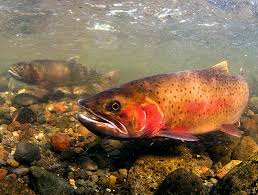Five adolescent friends in thigh-high waders are standing in a shallow river in Montana.
Allen is focused on the gear, fascinated by the lures he has spent hours creating. He marvels at the flies he has fashioned, how realistic they look. He wonders how the trout perceive his handiwork, whether the fish actually believe that what he has made out of fur, feathers, and wire truly resembles a living insect.
Bitsy is musing about the physics of casting. Flicking her wrist at variable angles sends her hook to distinct locations, some 30 feet away, some 40. She wonders how the wind affects her ability to send the lure close to that outcropping of rocks near the shore. She is thinking about studying physics in college.
Clarence is disconnected from the actual activity of fishing. Instead he marvels at the exquisite ponderosa pines towering over the campsite. How old are the trees? How long does it take them to grow to 130 feet? What kind of birds favor the highest part of the canopy? He spent an hour on-line learning about local birds. Will he be able to get a photograph of a downy woodpecker or a Black-capped chickadee?
Darby is attending to her appetite, concerned about catching fish for dinner, hoping the kids won’t have to eat the freeze dried food they have brought rather than fresh trout. She is excited about the prospect of cleaning and cooking. Her father taught her how to prepare a pan to the perfect temperature. She misses her dad.
Evan doesn’t care about fishing at all. He is reveling in the companionship, glorying that he has been included on this trip, that he has friends with whom he can spend three nights in the wild. Camaraderie and fellowship are important to him. A fish–if he somehow managed to catch one–will be only a minor bonus.
All five children are deriving meaning from their experience; the tricky bit is that their lessons may not be the same as yours. Their enjoyment may be predicated on factors into which you have no insight and over which you have no control.
Knowing what your kid are thinking and feeling is the first step toward helping them make choices of which you would approve. Allowing your kids to communicate what they are thinking and feeling is the first step toward knowing what those thoughts and feelings are.
Loving parents don’t have to act on every or even any whim or wish of their children at any age. Bedtime can still be bedtime and chores can still be chores. But knowing whether your kids are in tune to the flies, the casting, the mountains, the fish, or their companions can go a long way toward knowing how to stay connected with your kids.







One thought on “Fishing”
Good one.